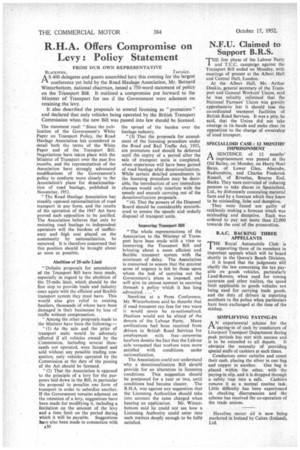R.H.A. Offers Compromise on Levy Policy Statement
Page 32

If you've noticed an error in this article please click here to report it so we can fix it.
FROM OUR OWN REPRESENTATIVE
BLACKPOOL. • Tuesday. S 400 delegates and guests assembled here this evening for the largest F-1 conference yet held by the Road Haulage Association, Mr. Bernard Winterbottom, national chairman, issued a 750-word statement of policy on the Transport Bill. It outlined a compromise put forward to the Minister of Transport for use if the Government were adamant on retaining the levy.
It also described the proposals to amend licensing as " premature " and declared that only vehicles being operated by the British Transport Commission when the new Bill was passed into law should be licensed.
The statement read: "Since the publication of the Government's White Paper on Transport Policy, the Road Haulage Association has considered in detail both the terms of the White Paper and of the Transport Bill. Negotiations have taken place with the Minister of Transport over the past five months, and the representatives of the
Association have strongly advocated modifications of the Government's policy to conform more closely to the Association's plans for denationaliza tion of road haulage, published in November, 1951.
"The Road Haulage Association has steadily opposed nationalization of road transport in any form, and the results of the operation of the 1947 Act have proved such opposition to be justified.
The Association believes that only by restoring road haulage to independent operators will the burdens of ineffici ency and high cost placed on the community by nationalization, be removed. R is therefore concerned that this position should be brought about as soon as possible.
Abolition of 25-mile Limit "Definite proposals for amendment of the Transport Bill have been made, • especially in regard to the abolition of the 25-mile limit, which should be the first step to provide trade and industry =once again with the efficient and flexible transport system they must have. This would also give relief to existing hauliers, thousands Of whom have been damaged in their businesses by loss of traffic without compensation.
" Among the other proposals made to the Minister have been the following:— " (1) As the sale and the price of transport units would be adversely 'affected if all vehicles owned by the Commission, including several thousands rot operated, were licensed and sold without any possible trading connection, only vehicles operated by the Commission at the date of the passing of the Act should be licensed.
"(2) That the Association is opposed to the principle of a levy for the purposes laid down in the Bill, in particular the proposal to penalize one form of transport in order to subsidize another. If the Government remains adamant on the retention of a levy, suggestions have been made for modifying it, including a limitation on the amount of the levy and a time limit on the period during which it will be payable. Suggestions have also been made in connection with
A30 the spread of the burden over the haulage industry.
"(3) That the proposals for amendment of the licensing procedure under the Road and Rail Traffic Act, 1933, are premature and should be deferred until the expiry of a period after the sale of transport units is completed, when experience will have been gained of road haulage after denationalization. While certain detailed amendments in the licensing procedure may be desirable, the introduction of any immediate changes would only interfere with the speedy and smooth carrying out of the denationalization proposals.
" (4) That the powers of the Disposal Board should be considerably strengthened to ensure the speedy and orderly disposal of transport units.
Improving Transport Bill "The whole representations of the Association to the Minister of Transport have been made with a view to improving the Transport Bill and bringing about a more efficient and flexible transport system with the minimum of delay. The Association is concerned to ensure that the greatest sense of urgency is felt by those upon whom the task of carrying out the Government's plans is imposed, and will give its utmost supnort to carrying through a policy which it has long advocated...."
Speaking at a Press Conference, Mr. Winterbottom said he thouaht that if road transport ran free for two years it would never be re-nationalized. Hauliers would not be afraid of the threats of the Labour Party. Many anolications had been received from drivers in British Road Services for
employment with free entemrise hauliers despite the fact that the Labour side suagested that workers were more satisfied with conditions under nationalization.
The Association could not understand why a denationalization Bill should provide for an alteration in licensing conditions. This suggestion should be postponed for a year or two, until conditions had become clearer. The R.H,A. was against any suggestion that the Licensing Authorities should take into account the rates charged when
hearing an application. Mr. Winterbottom said he could not see how a Licensing Authority could enter into such matters deeply enough to be fully satisfied.




















































































